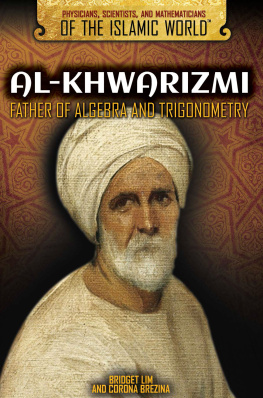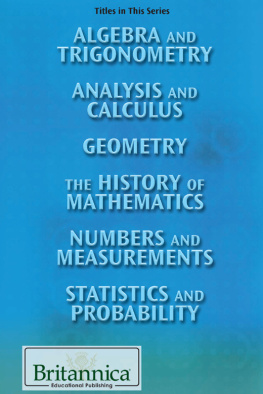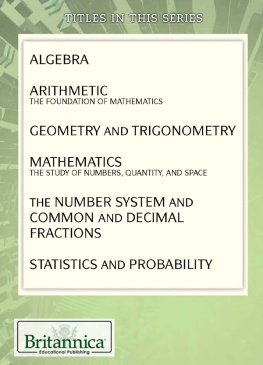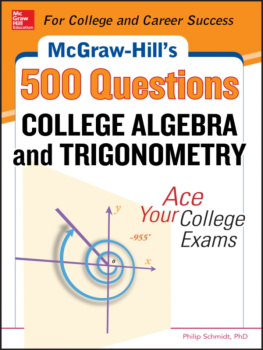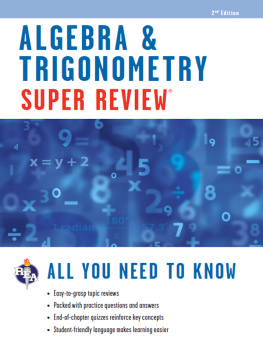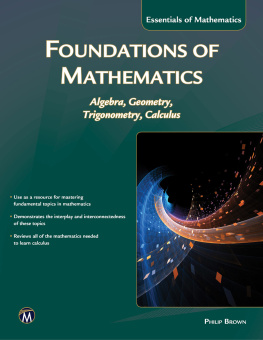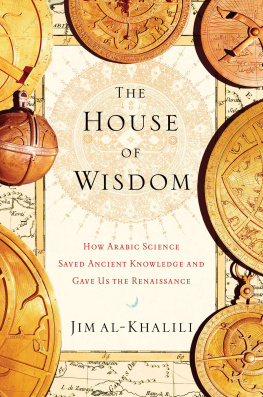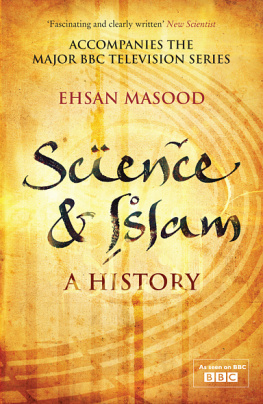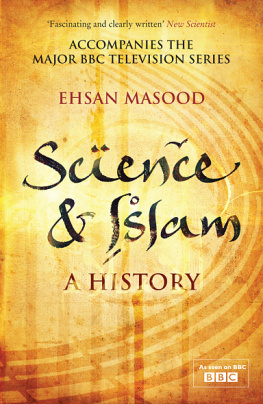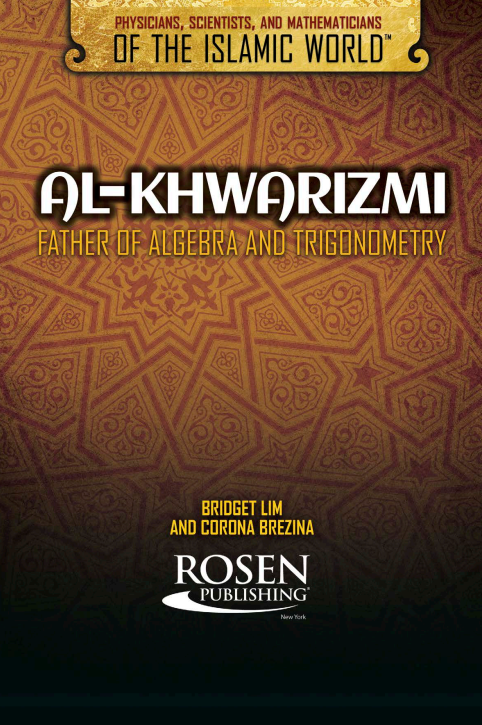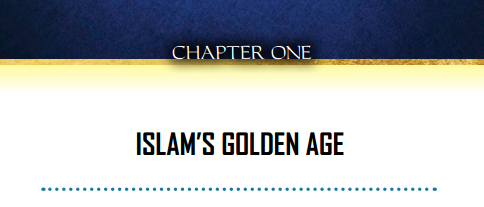- CHAPTER ONE
ISLAMS GOLDEN AGE - CHAPTER TWO
HIS LIFE AS WE KNOW IT - CHAPTER THREE
AL-KHWARIZMIS MATHEMATICALSCHOLARSHIP - CHAPTER FOUR
AL-KHWARIZMI THE ASTRONOMER - CHAPTER FIVE
THE LASTING INFLUENCE OFAL-KHWARIZMI
Published in 2017 by The Rosen Publishing Group, Inc.
29 East 21st Street, New York, NY 10010 Copyright 2017 by The Rosen Publishing Group, Inc.
First Edition
All rights reserved. No part of this book may be reproduced in any form without permission in writing from the publisher, except by a reviewer.
Library of Congress Cataloging-in-Publication Data
Names: Lim, Bridget | Brezina, Corona.
Title: Al-Khwarizmi : father of algebra and trigonometry / Bridget Lim and Corona Brezina.
Description: First edition. | New York : Rosen Publishing, 2017. | Series: Physicians, scientists, and mathematicians of the Islamic world | Audience: Grades 7-12. | Includes bibliographical references and index. Identifiers: LCCN 2015047772 | ISBN 9781508171447 (library bound) Subjects: LCSH: Khuwaarizmai, Muohammad ibn Mausaa, active 813-846--Juvenile literature. | Mathematicians--Iraq--Biography--Juvenile literature. |
Muslim mathematicians--Iraq--Biography--Juvenile literature. | Astronomers--Iraq--Biography--Juvenile literature. | Mathematics, Arab--Juvenile literature. | Astronomy, Arab--Juvenile literature. Classification: LCC QA29.K44 L56 2017 | DDC 509.2--dc23 LC record available at http://lccn.loc.gov/2015047772
Manufactured in the United States of America
CHAPTER ONE
ISLAMS GOLDEN AGE
CHAPTER TWO
HIS LIFE AS WE KNOW IT
CHAPTER THREE
AL-KHWARIZMIS MATHEMATICALSCHOLARSHIP
CHAPTER FOUR
AL-KHWARIZMI THE ASTRONOMER
CHAPTER FIVE
THE LASTING INFLUENCE OFAL-KHWARIZMI

w hen studying the Middle Ages (about 500 CE-1500 CE) in history class, many of us learn about the period known as the Dark Ages. This was a period during which scientific discovery in Europe came to a grinding halt and there was little emphasis placed on the arts and learning. Few members of the population were educated during these Dark Ages, and little scholarly work was done outside of Catholic monasteries. This focus on Western history leads us to believe that there was almost no intellectual advancement in our world during that vast period of time.
In the Middle East, however, a vast Islamic empire began spreading throughout the region, in addition to North Africa, eventually extending all the way to Spain and India. As the empire grew, its scholars began collecting knowledge from the conquered cultures. This harvesting of intellectual works led to Islams golden age of cultural and scientific achievement, which lasted from about 750 to 1258. Within the great city of Baghdad, Islamic rulers encouraged scholars to translate scientific and philosophical texts into Arabic. Scientists then used them to support their own research. Baghdad rapidly became one of the most sophisticated cities of the world, and Islamic scholars made important advances in mathematics, astronomy, geography, and many other sciences. When Europeans finally emerged from the Dark Ages, the translated texts and scientific progress of Islams golden age helped fuel Europes own Renaissance.
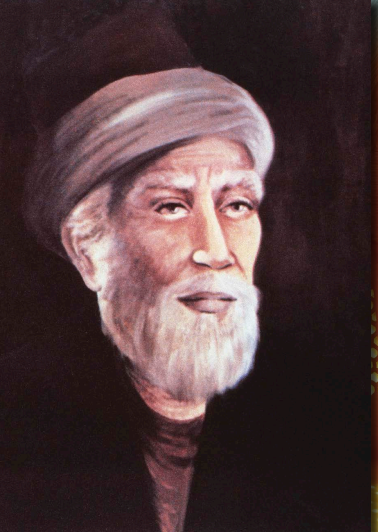
One of the elite scholars in Baghdad's prestigious House of Wisdom, al-Khwarizmi is best remembered for his famous work Al-Jabrwa al-Muqabala, the text that defined the branch of mathematics known as algebra.
One of the most influential figures of Islamic science was the ninth-century astronomer, mathematician, and geographer al-Khwarizmi. Al-Khwarizmi lived in Baghdad during the reign of Caliph al-Mamun, a great supporter of science and the arts. Al-Khwarizmi worked at the House of Wisdom, an academy established by al-Mamun for research and translation of classic texts of antiquity. Scholars at the House of Wisdom studied and translated the works of Greece, Babylonia, and other cultures. Al-Khwarizmi drew on Hindu sources for two of his major works.
Al-Khwarizmi is best remembered for his famous work Al-Jabr wa al-Muqabala, the text that defined the branch of mathematics known as algebra. The word algebra is derived from the title of al-Khwarizmis work. Mathematicians of other cultures had developed some basic algebraic concepts, but al-Khwarizmi was the first mathematician to present the elements of algebra in a systematic form.
Al-Khwarizmis other great mathematical work was his treatise on Hindu numerals. The Arabic system of numbers used today is of Hindu origin. Al-Khwarizmis treatise explained the decimal place value system and the concept of zero. Centuries after his death, it was translated into Latin and became influential in introducing Hindu numerals to Europe. The Latin translation was titled Algoritmi de Numero Indorum, or Al-Khwarizmi Concerning the Hindu Art of Reckoning. Algoritmi was a Latin transcription of al-Khwarizmi, but the word gradually changed in spelling and meaning. The modern term algorithm is derived from al-Khwarizmis name.
The scholarship of al-Khwarizmi and other Islamic men of knowledge went on to inspire a renewed interest in learning in Europe. Around the twelfth century, thanks in great part to the work of Islamic scholars, the Italian Renaissance ushered in a revival in classical Greek and Roman culture and spread throughout the continent.
T he heart of Islams golden age was the city of Baghdad, located in present-day Iraq. Because of the citys enviable location on the banks of the Tigris and Euphrates Rivers and the surrounding fertile land, it attracted a great variety of people. Trade caravans loaded with goods passed through the city, bringing wealth and contributing to the citys diversity. People of many different races, religions, and backgrounds lived together in peace.
During the reign of the Abbasid dynasty, scholars flocked to the city, inspired by the caliphs interest in learning and the establishment of the House of Wisdom. Through the work of these scholars, a wealth of knowledge from other cultures was translated and preserved.
THE PROPHET MUHQMMQD
The prophet Muhammad was born in Mecca in present-day Saudi Arabia in 570 CE. Around the year 610, he was visited by a vision of the archangel Gabriel. Gabriel declared him a prophet of God, or Allah, and more visions followed. Encouraged by his wife and uncle, Muhammad began preaching the messages presented to him in these visions, which were later collected in the Quran, the holy text of Islam.

